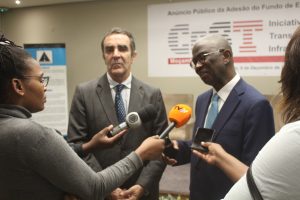Member since 2019
Prior to CoST: Public infrastructure in context
According to Transparency International’s Corruption Perceptions Index, in 2019, Mozambique ranked 146th out of 198 countries, with a score of 26 out of 100. This was an increase of 12 places since 2018. Meanwhile, according to the United Nations’ Electronic Governance Development Index, Mozambique scored 0.35 in 2020, placing it at 163 out of 193 countries globally.
At a workshop held jointly by CoST and the International Labour Organisation (ILO) in 2019, it became clear that steps to enhance transparency and accountability are often already in place, but are implemented in a fragmented and unsystematic manner. The value of CoST’s tools and standards was to help align these efforts, join up approaches between government departments, and reduce duplication across the whole of the sector. This would especially be pertinent as Mozambique continues to grapple with reconstruction after Cyclones Idai and Kenneth, and increases disaster preparedness with more resilient infrastructure.
CoST Mozambique: How it all began

In 2019, the Mozambique Road Fund submitted a membership application letter to the CoST board, as part of the CoST competitive process. The Road Fund’s interest in joining CoST came because of the aforementioned workshop, which was held to explore the need for greater transparency and accountability in Mozambique’s infrastructure sector. The workshop focused on the CoST core pillars of independent review, publication of data, civic engagement, multi-stakeholder working, and their potential impact in Mozambique.
The Road Fund, which hosts the CoST Mozambique programme, stated in its application that CoST could be a catalyst for addressing some of the challenges the country faces. Through their membership, Mozambique planned to publish data in line with the Open Contracting for Infrastructure Data Standard (OC4IDS) for projects carried out through the Integrated Feeder Road Development Project and scale up to other sectors in the medium and long term of their membership. To improve public engagement in these projects, the programme anticipated engagements with newspapers and community radio stations to disseminate information and results of the independent reviews on sampled projects in local dialects. At the launch of CoST Mozambique’s programme in November 2019, CoST Board Deputy Chair George Ofori said:
It is imperative that the country rebuilds in a resilient and sustainable way: adopting the CoST approach to rural road repairs in affected areas – and potentially more widely in the future – will help ensure that projects are planned and implemented in a transparent, inclusive, and accountable way, which will help achieve this long-term goal.
Multi-Stakeholder Working
CoST brings together stakeholder groups with different perspectives and backgrounds from across government, the private sector, and civil society. Through each member’s Multi-Stakeholder Group, these entities can guide the delivery of CoST and pursue infrastructure transparency and accountability within a neutral forum.
Due to the impact of COVID-19, CoST Mozambique’s activities in 2019 were scaled back. However, the Road Fund received support for the establishment of a Multi-Stakeholder Group (MSG), which was announced in 2020. Organisations represented on the MSG include the Road Fund, the Ministry of Economy and Finance, the Mozambican Federation of Transport Association, and the Foundation for Community Development.
After the successful launch of the CoST Mozambique programme, a multi-stakeholder group of 12 members from government, private sector, and civil society was established, governance documents were put in place, and a national secretariat was defined. Championed by the World Bank and Chaired by the Executive of the Roads Fund, the CoST Mozambique MSG is highly positioned to influence sector reforms.
A scoping study
Following the launch of the programme, a scoping study was undertaken that measured the level of transparency in the sector and provided recommendations for improvement. The scoping study results revealed that the legal and institutional landscape was applicable for the implementation of infrastructure transparency, sector challenges could easily be identified, and the study highlighted key sector issues, including over-invoicing, corruption/bribery, inefficient spending, lack of information, and direct award (without tender).
CoST Mozambique emerged in a context of public investment management reforms (Decree 52/2020 of 3 July) that approved the Legal Framework for Public Investment Management in Mozambique with guiding principles for public investment, the objectives, and the public investment management structure. There was a desire to implement CoST tools and standards in a collective action arrangement to identify governance constraints and promote reforms of the legal, institutional, and policy framework, and their implementation in favour of greater transparency, accountability, and efficiency in the development of public infrastructure.
Data publication
The data publication process ensures that data about the purpose, scope, costs and execution of infrastructure projects is open and accessible to the public, and that it is data is published in a timely manner.
The Law for Access to Information (LDI) in Mozambique provides for the proactive publication of all information of public interest held by public entities, including institutions responsible for the development of public infrastructure. The scoping study found no confidentiality clauses or information considered a state secret that compromises the proactive publication of information. However, several institutional challenges compromise the proactive and reactive publication of information.
To this end, CoST Mozambique, working closely with the Road Fund, started developing an FDE Portal for infrastructure projects, piloting with data from the roads sector.
Civic engagement
Social accountability and civic engagement ensures that information on public infrastructure projects is in the public domain. CoST works with stakeholders such as the media and civil society to promote the findings of the assurance process and ensure decision makers are held to account.
As the CoST Mozambique programme evolves, with efforts to champion data publication, the MSG is challenged with implementing a strong social accountability programme that will facilitate data use to influence sector reforms and institutionalize transparency, accountability, and participation in the sector.
Get in touch
Agnes Prado – CoST Mozambique Manager
mozambique@infrastructuretransparency.org
Useful Links
Annual workplan 2025 https://infrastructuretransparency.org/wp-content/uploads/2025/04/Mozambique-annual-workplan-2025.pdf
